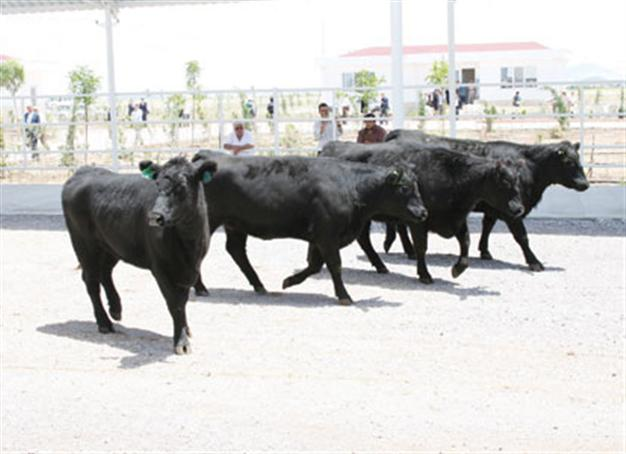
This photo shows angus cattle imported from Australia. ‘Imported angus cattle in Anatolia are younger than 18 months and according to the related bylaw, they must be at least 2 years old to be sacrificed,’ says Mehmetçik Foundation’s Güloğlu. AA Photo.
The Turkish Agriculturists’ Association (TZD) is warning of a lack of meat ahead of the Kurban Bayram holiday just as organizations that accept donations for the feast are complaining that imported livestock are too young to be sacrificed.
Turkey will be short 170,000 tons of meat by 2015, İbrahim Yetkin, the general chairman of the TZD, said in a recent interview with Anatolia news agency.
The gap between producer and consumer prices in meat markets is considerably large, said Yetkin. “It cost the meat supplier 17 Turkish Liras to produce one kilo of veal as of September this year. Meanwhile, meat at the Meat and Fish Institute (EBK) is hardly sold at 15 liras. In response, the EBK is importing meat which costs more than the price offered by other meat suppliers. The profit range for intermediaries in the market is between 20 and 30 percent in this sector.”
Due to such developments in the meat market, the number of livestock owned by small suppliers has decreased, leading many to consider leaving the market, Yetkin said. Furthermore, unregistered livestock, mainly cattle, cost the Turkish government $750 million, he added.
Too young for sacrifice
Meanwhile, organizations that accept sacrificial animal donations for the holiday will have problems with gathering donations this year because the age of imported angus cattle is 18 months, whereas a sacrificial animal should be at least 2 years old, according to a report from daily Hürriyet yesterday.
“The sacrificial animals donations will be halved this year, as there are not enough animals in Anatolia,” said Salih Güloğlu, the chairman of the Mehmetçik Foundation.
The supply of sacrificial animals has been problematic this year, Güloğlu said, adding that only 38,000 donators had applied to the foundation for donations, compared to 61,000 people in 2010. “The reason is that the conditions to fulfill the criteria for sacrificial animals in accordance with recently approved legislation are hardly available in Anatolia.”
Livestock in the Thrace region differed from those in the country’s Anatolian region, Güloğlu said. “Imported angus cattle in Anatolia are younger than 18 months and according to the related bylaw, they must be at least 2 years old. It is possible to find sacrificial livestock that fit the criteria in Thrace region, but companies there do not provide services in Anatolia.”
The price for sacrificial animals is 460 liras, Güloğlu said, adding that 49 liras of that figure was tax. “It is strange that we pay taxes for sacrificial donations. A fee of 90 liras was also charged for maintenance and distribution per animal, and an additional 30 liras for freight. Our foundation’s estimated cost for all these is 36 liras per kilo.”
Authorities should be careful to check that the money donated to associations and foundations for the sacrificing of the animals ultimately arrives at the intended destination, Anatolia reported Agricultural Chambers’ Union General Chairman Şemsi Bayraktar as saying yesterday.